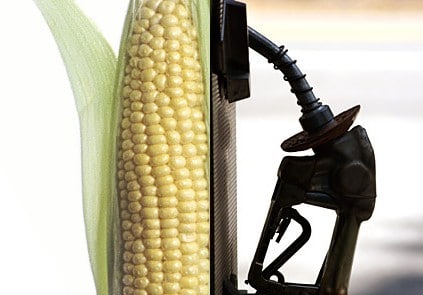At a green business conference on Monday, Al Gore admitted that his support for corn ethanol subsidies was a mistake. This news comes weeks before tax credits are up for renewal.
U.S. tax breaks for ethanol make it profitable for refiners to use
the fuel even when it is more expensive than gasoline. Total ethanol subsidies reached $7.7 billion last year according to the International Energy Agency. In fact, biofuels worldwide received more subsidies than any other form of renewable energy.
Gore argued that “It is not a good policy to have these massive subsidies for [U.S.] first-generation ethanol”. Giving extraordinary subsidies to first generation feedstocks was a mistake, he says. “The energy conversion ratios are at best very small.”
Mr. Gore is not alone in thinking that corn-based ethanol is a losing proposition. Several environmental groups have voiced concerns that the market sets food and fuel needs in direct competition. In addition, there are concerns about accelerating the conversion of rainforests and conservation lands to farmland. In California, regulators were prepared to declare corn biofuel’s carbon footprint too large to help the state fight climate change after new tough emissions standards passed. As the Daily Climate noted, greenhouse emissions and loss of the carbon sink associated with deforestation and disruption must be counted towards the biofuel’s total emissions, qualifying them as dirty.
Numerous studies suggest that corn ethanol is among many crop-based biofuels that encourage land-use changes that are, on the whole, detrimental to both environment and climate. According to the Sierra Club and World Watch Institute, next-generation biofuels – derived in less energy-intensive ways, and from non-food sources like switchgrass – are potential future solutions.
A recent paper in the Proceedings of the National Academy of Sciences corroborates the astounding impact of corn ethanol in its finding that Brazil risks incurring a 250-year carbon debt based on the deforestation expected by 2020 as it expands production of sugarcane ethanol and soybean biodiesel.
Gore noted that a major roadblock to getting rid of these multi-billion dollar subsidies has been corporate lobby groups. “It’s hard once such a program is put in place to deal with the lobbies that keep it going”, he noted.
One such lobby group has been the corporate-funded Renewable Fuels Association. According to Matt Hartwig on their blog, corn ethanol is more efficient than ever, and does not compete with the food supplies. That’s not what the prevailing peer-reviewed literature says, according to David Tilman, a University of Minnesota professor of ecology who has studied biofuels’ conflict with food crops. According to Sourcewatch, the Renewable Fuels Association is a supporter of the Alliance for Abundant Food and Energy whose other members include Archer Daniels Midland, Deere & Company, DuPont and Monsanto. Interestingly, Matt Hartwig is also involved with the Astroturf group Center for Science and Culture that seeks to “defeat Darwinism”. Maybe fanciful lies are his specialty.
The corn ethanol of here and now has a hefty ecological footprint, and is creating an ecological headache. Kudos to Gore for speaking out that his support for the subsidies was based on votes, and not science.
Image credits: Renaissance Ronin.
Subscribe to our newsletter
Stay up to date with DeSmog news and alerts






